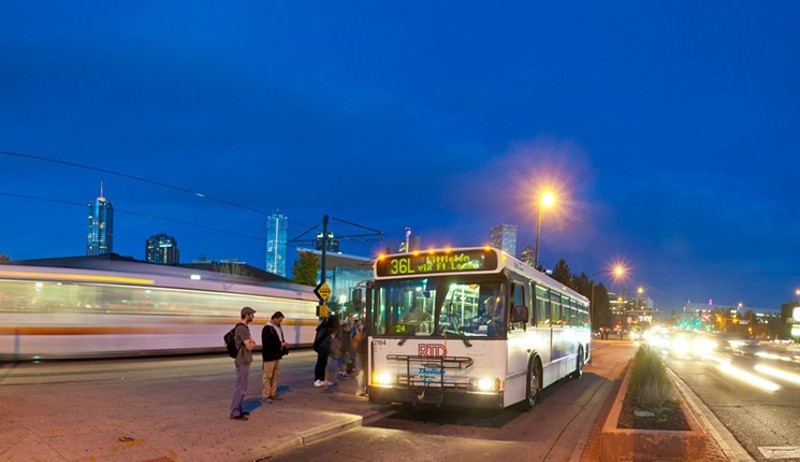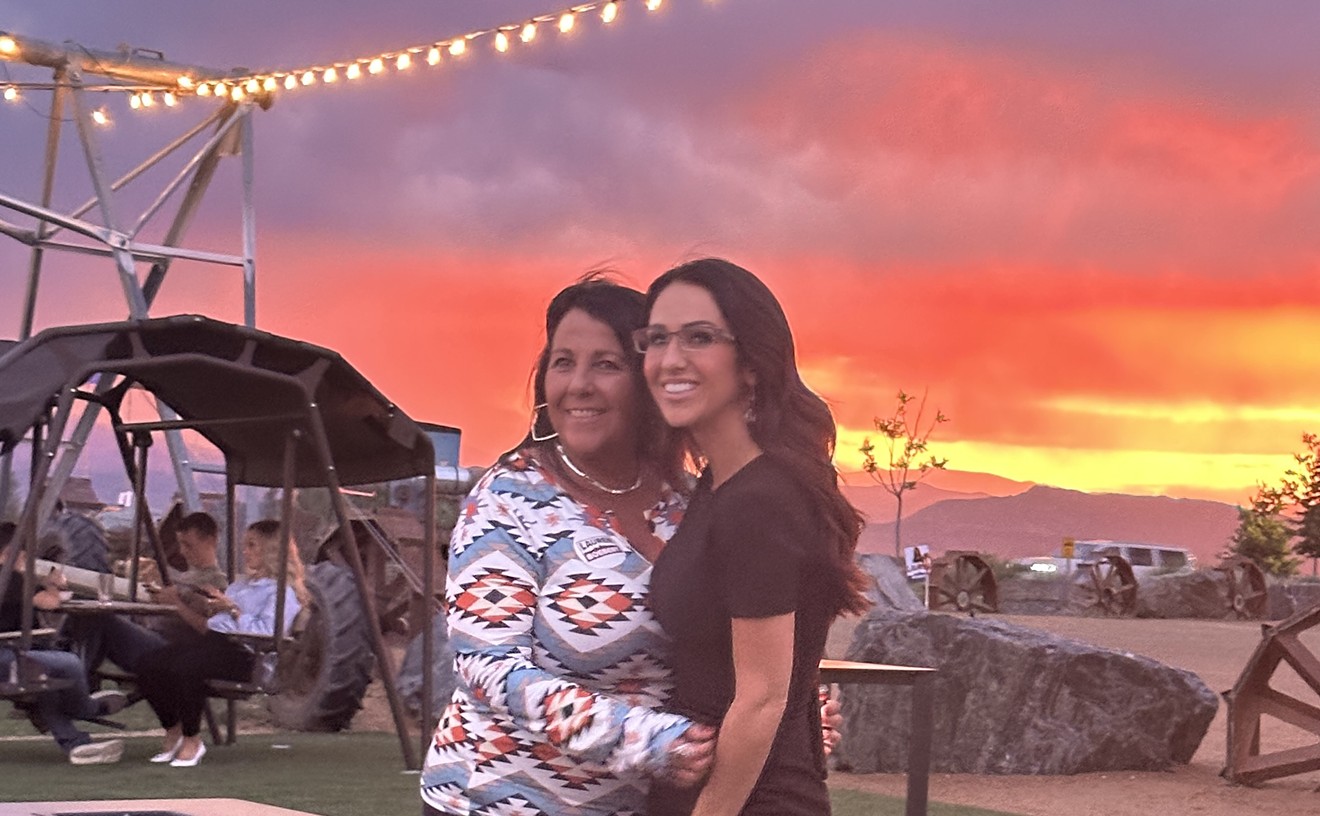On a normal Saturday, while driving RTD’s 15L bus line, Suna Karabay only gets about fifteen to twenty passengers — often employees in the hospitality industry headed to cover weekend shifts in downtown Denver.
But on July 1, the first day of RTD’s Zero Fare for Better Air program, which is offering two months of free transit, her bus was completely full.
“I usually know who rides my bus,” says Karabay, who's driven for RTD for over a decade. “I get the same people. But I even had kids today. They came with their families just to ride the bus.”
Although she has mixed feelings about the free ride program — having been the subject of a June 2022 Washington Post story by reporter Eli Saslow titled “Anger and heartbreak on Bus No. 15,” which described how the pandemic was impacting bus drivers across the country — Karabay is feeling positive about what the next two months will bring. Even her regulars seemed happier on Saturday.
“They were really friendlier,” Karabay says. “They said, smiling, ‘Good morning.’”
The RTD vet has been telling her everyday passengers to save their money from single fares over the next two months so they’ll have enough to buy monthly passes up front in September, when the free fares end.
Along with helping people save money, she’s hoping July and August will bring more kids on her bus and help spread awareness about transit — while making it harder for drug users and delinquents to get by unnoticed.
“I'm really hoping to make it safe on the bus so kids can come,” Karabay says. “Kids like the big buses. …They make happy environments. And I don't want drugs, smoking, weed fumes on the bus.”
In order to get more youths to ride, she insists that buses need to be safe — and RTD is taking steps toward improving safety, like implementing a new code of conduct last month. Contrary to what some people believe, Karabay doesn’t think the free rides cause more people to use drugs on the bus.
“I had some people complaining, ‘Oh, now RTD, it's going to be free, and all the drug users are going to be on the bus,’” she says. “We still have the same rules and regulations, and we keep getting training on how to protect the environment we are in.”
When drivers notice someone using drugs, they are instructed to stop the bus and get a new one that’s clean, according to Karabay. This keeps people safe from secondhand inhalation, she says.
Karabay and other drivers have become attuned to the signs of when someone might be using drugs on RTD. One way is if people bring blankets on; they may use them to cover their heads so they can smoke in private.
Now, Karabay says, people with blankets must fold them and put them in a bag before they board.
Another sign is when other passengers who were at the back of the bus move forward, which can often mean they’re moving to avoid a disruptive passenger.
“We are always on the watch,” Karabay says. “When I see people moving forward, I just get up and go and see what's going on. Then I open both doors and I tell them they need to leave or I'm going to call the police.”
She wants more resources for people who are addicts, but doesn’t know if there’s much more RTD itself — or even the police — can do.
However, Karabay firmly believes that more passengers riding during July and August will make it less likely that people will use drugs on the bus, since riders often speak up to remind others that using drugs on public transit isn’t allowed.
“That really helps, because I am driving seventy people on a bus, and I can’t see every corner of it,” Karabay says. “Usually, when it is more quiet and then they get their own space they start doing it, but when we add more people, I don’t have any issues at all.”
On July 1, Karabay didn’t have any incidents on her shift from 5 a.m. to 2 p.m. In a regular six-day workweek, she says she will typically remove three or four people from the bus.
Over the years, Karabay has learned which people she needs to keep a closer eye on in the same way she knows her regulars. She knows who has used drugs on her bus before and can often predict when they will come back.
This year, Karabay feels more prepared for Zero Fare for Better Air than last year, because RTD provided more training. “If there’s a cloud, we need a training for that,” she jokes.
Although Karabay says rainy weather like Denver has experienced this spring and summer causes more people to get on the bus to avoid getting soaked, drivers are ready for that and any complications that may arise.
Passengers, too, are more prepared in the second year of the program, according to Karabay. Zero Fare for Better Air is made possible by a grant from the Colorado Energy Office that's designed to help transit agencies in the state encourage public transportation use during ozone season.
Karabay hopes enough people make an honest effort to use the bus and that the program cuts down on traffic in Denver, which she says is worse than ever lately.
With two months of free rides ahead, Karabay thinks there’s enough time for people to truly adapt.
“All Europeans ride buses, why not here?” she says. “RTD is doing way more than what transportation is supposed to do. We are getting all the training. We are on the job. We are doing our best, and we really want more people to ride. … That will help us make the buses safer and the environment cleaner.”
[
{
"name": "Air - MediumRectangle - Inline Content - Mobile Display Size",
"component": "12017618",
"insertPoint": "2",
"requiredCountToDisplay": "2",
"watchElement": ".fdn-content-body",
"astAdList": [
{
"adType": "rectangle",
"displayTargets": "mobile"
}
]
},{
"name": "Editor Picks",
"component": "17242653",
"insertPoint": "4",
"requiredCountToDisplay": "1",
"watchElement": ".fdn-content-body",
"astAdList": [
{
"adType": "rectangle",
"displayTargets": "desktop|tablet"
},{
"adType": "rectangle",
"displayTargets": "desktop|tablet|mobile"
}
]
},{
"name": "Inline Links",
"component": "18838239",
"insertPoint": "8th",
"startingPoint": 8,
"requiredCountToDisplay": "7",
"maxInsertions": 25
},{
"name": "Air - MediumRectangle - Combo - Inline Content",
"component": "17261320",
"insertPoint": "8th",
"startingPoint": 8,
"requiredCountToDisplay": "7",
"maxInsertions": 25,
"watchElement": ".fdn-content-body",
"astAdList": [
{
"adType": "rectangle",
"displayTargets": "desktop|tablet"
},{
"adType": "rectangle",
"displayTargets": "desktop|tablet|mobile"
}
]
},{
"name": "Inline Links",
"component": "18838239",
"insertPoint": "8th",
"startingPoint": 12,
"requiredCountToDisplay": "11",
"maxInsertions": 25
},{
"name": "Air - Leaderboard Tower - Combo - Inline Content",
"component": "17261321",
"insertPoint": "8th",
"startingPoint": 12,
"requiredCountToDisplay": "11",
"maxInsertions": 25,
"watchElement": ".fdn-content-body",
"astAdList": [
{
"adType": "leaderboardInlineContent",
"displayTargets": "desktop|tablet"
},{
"adType": "tower",
"displayTargets": "mobile"
}
]
}
]











